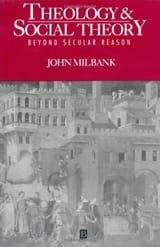Search Results
7/6/2025, 1:50:08 AM
>>24524723
The "ontologies of violence" said to come to us through Nietzsche to Foucault are really just Calvin's God various immanentized, humanized, and/or pantheized. The funny thing about this last evolution is that, from the outset with Nietzsche, it should have been obvious what it implied—not the radical leftist politics of its theorists, but might makes right and mythologized fascism. Only now are we seeing the post-modernization of the right and this coming full circle.
The "ontologies of violence" said to come to us through Nietzsche to Foucault are really just Calvin's God various immanentized, humanized, and/or pantheized. The funny thing about this last evolution is that, from the outset with Nietzsche, it should have been obvious what it implied—not the radical leftist politics of its theorists, but might makes right and mythologized fascism. Only now are we seeing the post-modernization of the right and this coming full circle.
7/5/2025, 3:19:17 PM
>>24523245
Fair point. I think Dante is pretty good on this and Saint Gregory. Nevertheless, the move to wholly get the Church "out of politics," is also deeply flawed. As Aristotle says, politics is to the Good as metaphysics is to the True, it is the archetectonic science of practical reason. The Church cannot leave this behind without essentially denying man's higher telos as a spiritual being.
The Reformation move to carve out a private, secular space, and to internalize religion was itself motivated by a very specific theology: volanturism. Man became the image of a God that was sheer will. Nietzsche, Foucault, and Deleuze are as much inheritors of this theology as Hobbes, Locke, and Rawls. The univocity of being also looks large here. Denial of the Analogia Entis is what allows for the absolutization of finite human reason in the Enlightenment.
Fair point. I think Dante is pretty good on this and Saint Gregory. Nevertheless, the move to wholly get the Church "out of politics," is also deeply flawed. As Aristotle says, politics is to the Good as metaphysics is to the True, it is the archetectonic science of practical reason. The Church cannot leave this behind without essentially denying man's higher telos as a spiritual being.
The Reformation move to carve out a private, secular space, and to internalize religion was itself motivated by a very specific theology: volanturism. Man became the image of a God that was sheer will. Nietzsche, Foucault, and Deleuze are as much inheritors of this theology as Hobbes, Locke, and Rawls. The univocity of being also looks large here. Denial of the Analogia Entis is what allows for the absolutization of finite human reason in the Enlightenment.
Page 1
